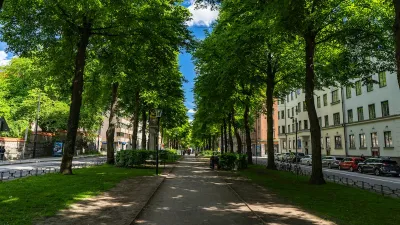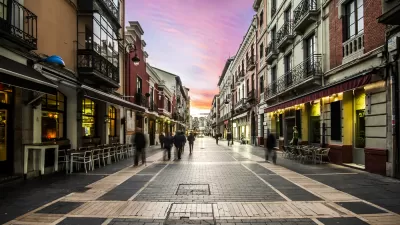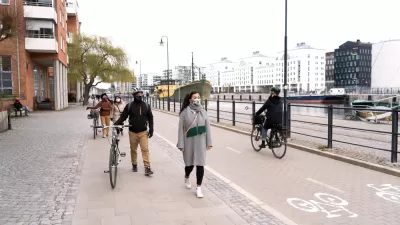Rather than trying to meet all of a community's needs within a one-minute radius, Sweden's Street Moves pilot program gives residents the power to decide how street space gets used.

Move over, "15-minute city," writes Feargus O'Sullivan for Bloomberg. Sweden is pioneering the "one-minute city," a hyper-local vision inspired by the push for decentralizing urban services and creating dense, walkable communities where residents can find almost everything they need within minutes.
Locally-focused schemes such as the 15-minute city and Barcelona's famous superblocks gained steam in 2020 as shelter-in-place orders made people hyper-aware of their immediate neighborhoods and emphasized the need for locally available services and local infrastructure that improves quality of life. Sweden's approach focuses even more closely on "the space outside your front door — and that of your neighbors adjacent and opposite," according to Dan Hill, director of strategic design for Vinnova, Sweden's national innovation agency.
The project, dubbed Street Moves, is being piloted in four sites around Stockholm, where residents can decide how street space is used and allocated through community workshops and consultations. The goal isn't to make everything available within one minute, but rather to reimagine the patches of street immediately outside the home as "critical connecting spaces for communities" and not just "places to move and store cars." If successful, Sweden plans to implement the program on every street in the country by 2030.
FULL STORY: Make Way for the ‘One-Minute City’

Alabama: Trump Terminates Settlements for Black Communities Harmed By Raw Sewage
Trump deemed the landmark civil rights agreement “illegal DEI and environmental justice policy.”

Planetizen Federal Action Tracker
A weekly monitor of how Trump’s orders and actions are impacting planners and planning in America.

The 120 Year Old Tiny Home Villages That Sheltered San Francisco’s Earthquake Refugees
More than a century ago, San Francisco mobilized to house thousands of residents displaced by the 1906 earthquake. Could their strategy offer a model for the present?

Opinion: California’s SB 79 Would Improve Housing Affordability and Transit Access
A proposed bill would legalize transit-oriented development statewide.

Record Temperatures Prompt Push for Environmental Justice Bills
Nevada legislators are proposing laws that would mandate heat mitigation measures to protect residents from the impacts of extreme heat.

Downtown Pittsburgh Set to Gain 1,300 New Housing Units
Pittsburgh’s office buildings, many of which date back to the early 20th century, are prime candidates for conversion to housing.
Urban Design for Planners 1: Software Tools
This six-course series explores essential urban design concepts using open source software and equips planners with the tools they need to participate fully in the urban design process.
Planning for Universal Design
Learn the tools for implementing Universal Design in planning regulations.
Clanton & Associates, Inc.
Jessamine County Fiscal Court
Institute for Housing and Urban Development Studies (IHS)
City of Grandview
Harvard GSD Executive Education
Toledo-Lucas County Plan Commissions
Salt Lake City
NYU Wagner Graduate School of Public Service





























